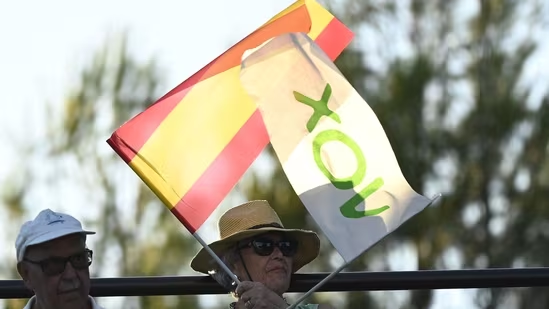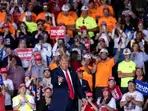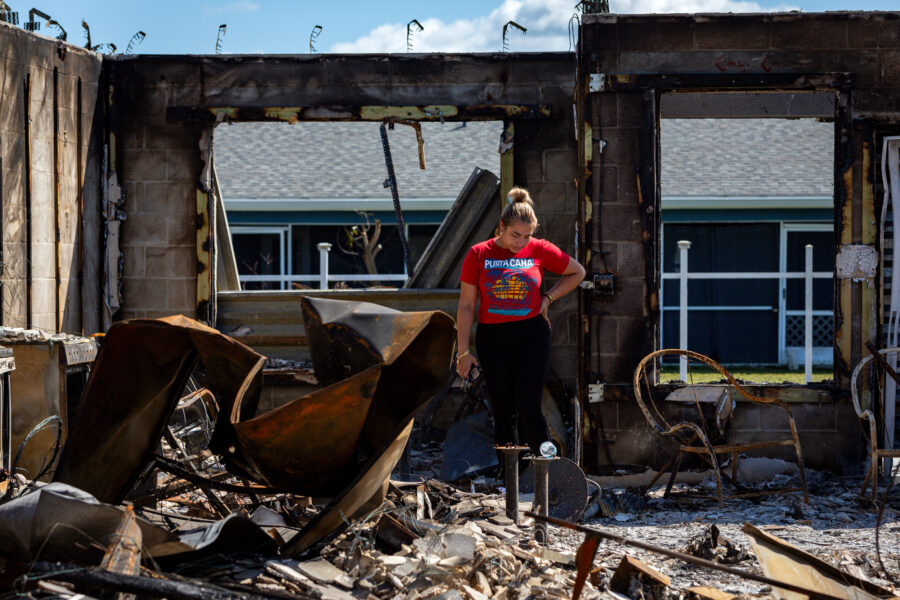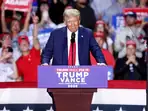Spain’s election ends in deadlock
FOR THE past week, observers of Spain’s election have focused on the prospect of the hard Right entering government, for the first time since the return of democracy in 1978. That, as it turned out, was not the main story. Experts in Spain and elsewhere failed to reckon with Spain’s comeback-artist-in-chief: Pedro Sánchez, the Socialist prime minister. As the last votes were being counted on Sunday night, the Right- and Left-wing blocs were virtually tied—and neither had a clear path to assembling a majority and installing a government. The Right-wing bloc, led by the centre-right People’s Party (PP), came first as predicted. The PP took 136 of 350 seats. But polls had predicted it would get close to 150. Added to the 33 seats of the hard-right Vox party, that fell short of the 176 needed for a majority.  PREMIUM
PREMIUM
The big surprise was the outperformance of Mr Sánchez’s Socialists. Instead of being punished as polls had predicted, the party looked set to gain a couple of seats, finishing with 122. Its preferred coalition partner, the far-left Sumar party, won 31. That left them well short of a majority too. Four regional parties, including Basque and Catalan secessionists, might be willing to vote to support a minority Socialist-Sumar government. But even with their help, the Socialists and Sumar would be just short of the needed figure.

The PP has mounted a big comeback over the past few years, gaining 47 seats after a miserable result in 2019. But its result will be measured against recent expectations. Here the party clearly underperformed, raising questions about its strategy. Its leader, Alberto Núñez Feijóo, was seen as winning the campaign’s first debate—a two-man affair against Mr Sánchez—and chose to sit out the next two encounters, which included more parties. This looked like a conservative move to protect his lead. He may also have wanted to avoid being seen onstage next to Vox: Throughout the campaign, he refused to either accept or to rule out a coalition with the hard Right, though it was always his likeliest option.
The party seemed to lose momentum in the campaign’s final week. Mr Feijóo made factual mistakes about pensions in a television interview. An old picture of him with a man later convicted of drug trafficking resurfaced in the media, and he took a break from the campaign trail because of back pain. None of these things should have been decisive. But the swagger with which the party headed into the election had dissipated.
The night’s biggest loser was Vox. Spain’s electoral system punishes parties that are spread thinly across the map. Vox’s vote share fell only from about 15.2% to 12.4%, but the party dropped from 52 deputies to 33. And its presence in a putative coalition alongside the PP may have scared some voters away from the latter, as well as energising voters for the Socialists and Sumar. With the results in, Vox’s leader, Santiago Abascal, complained about “clearly manipulated polls” depressing his party’s vote. But he conceded that he will not enter government this time round.
The other loser of the night was Esquerra Republicana, one of the two main separatist parties in Catalonia. The Socialists won in Catalonia and Esquerra lost six deputies. This seemed to vindicate Mr Sánchez’s strategy of cooling off the Catalan conflict. He has pardoned leaders of the unconstitutional independence referendum of 2017 and eliminated the crime of “sedition” from the criminal code, replacing it with a milder offence. This infuriated his enemies, but seems to have paid off in Catalonia itself. Esquerra’s leader in Madrid, Gabriel Rufián, promised that in exchange for supporting any new Socialist-led government, he would demand that any partners in Madrid “respect our country”.
The final important group in parliament is the other main Catalan separatist party, Junts per Catalunya. The more strident of the two separatist groups, it flounced out of Catalonia’s government last year, and has been trying to restore its fortunes. It opposed Esquerra’s strategy of gradually mending ties with the government in Madrid. It came only fifth, by votes, in Catalonia. Its de facto leader remains Carles Puigdemont, in exile in Belgium since the illegal referendum of 2017, which he led. He has stated that “Sánchez will not be prime minister with the votes of Junts,” calling the prime minister “a guy you wouldn’t even buy a used car from”. It is a hard position to back off from.
None of the other non-PP parties will support a government that includes Vox. Junts will not join Mr Sánchez’s rainbow grouping. That leaves two options. Mr Feijóo called on all parties to enter a dialogue on whether they might allow the PP to govern, possibly in a minority government. He explicitly warned the Socialists not to veto this, noting that Spain had never been led by a prime minister who had not come first in the election. But the country has no tradition of grand coalitions. And it is hard to see Mr Sánchez agreeing to abstain so that the PP could govern alone when it is 40 seats short of a majority.
Spain’s king will now invite one of the candidates (presumably Mr Feijóo) to try to form a coalition. In the meantime, Mr Sánchez will stay on as prime minister. Should no one succeed in putting together a government, the country will have to hold new elections, which no one wants. But to avoid them, one of the currently immovable objects will have to budge. This was the first time in Spain’s modern democratic history that it staged a vote in the hottest part of the summer. Now, instead of a much-needed holiday followed by a return to work in the autumn, it faces the grim prospect of doing it all again.
Correction (July 24th): A previous version of this article said that Junts per Catalunya came fourth by votes in Catalonia, not fifth. Sorry.
© 2023, The Economist Newspaper Limited. All rights reserved. From The Economist, published under licence. The original content can be found on www.economist.com
Experience unrestricted digital access with HT Premium
Explore amazing offers on HT + Economist Start 14 Days Free Trial Already Subscribed? Sign In
Disclaimer: The copyright of this article belongs to the original author. Reposting this article is solely for the purpose of information dissemination and does not constitute any investment advice. If there is any infringement, please contact us immediately. We will make corrections or deletions as necessary. Thank you.
Title:Spain’s election ends in deadlock
Url:https://www.investsfocus.com









